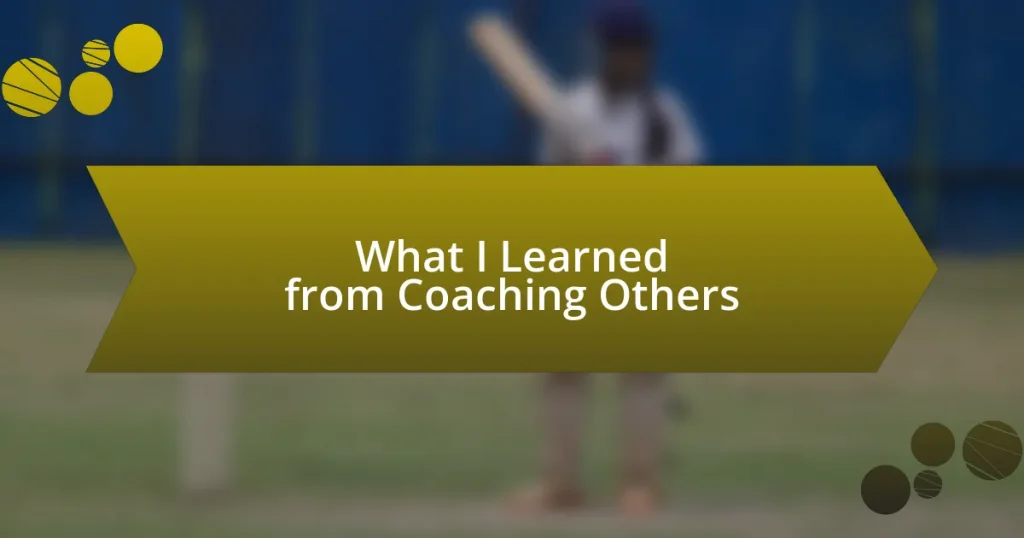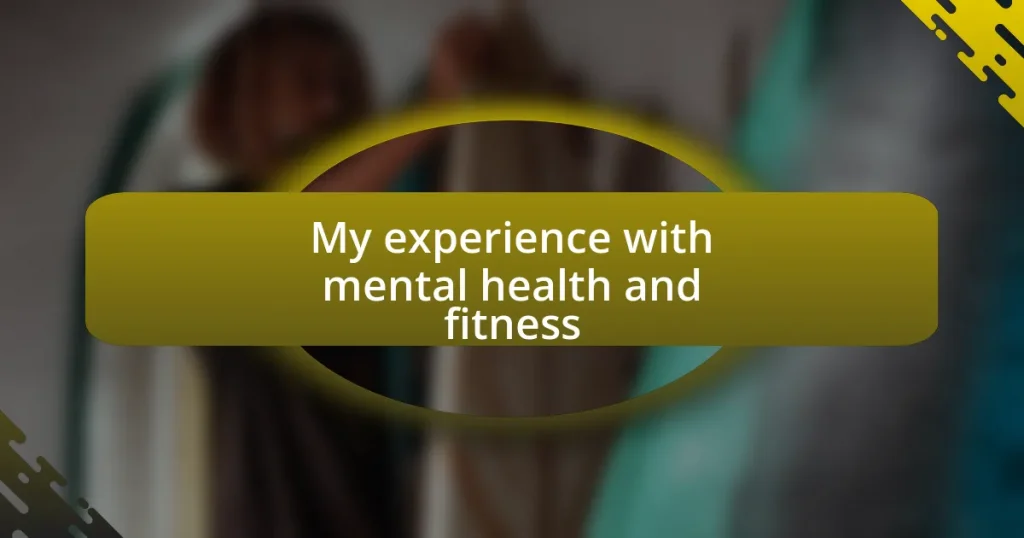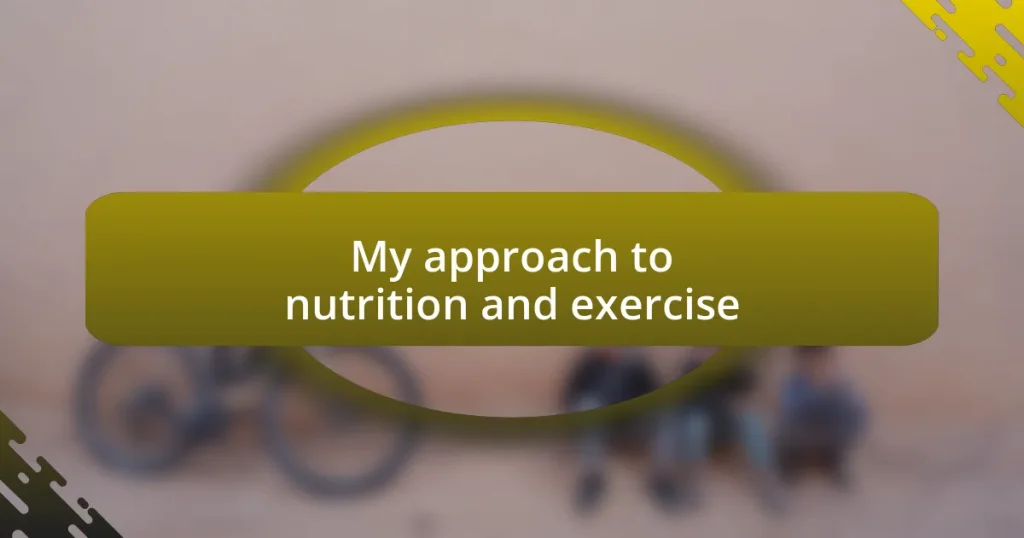Key takeaways:
- Coaching facilitates self-discovery and growth through trust and supportive relationships.
- Active listening and adaptability are crucial for effective coaching and deeper understanding.
- Developing empathy enhances the coaching experience by validating coachees’ emotions.
- Creating actionable goals collaboratively fosters ownership and motivates further progress.

Understanding the Role of Coaching
Coaching is more than just giving advice; it’s about fostering self-discovery and growth. I remember a time when one of my coachees felt stuck in his career. Instead of telling him what to do, I guided him to explore his own values and passions, which ultimately led him to a more fulfilling path. Have you ever noticed how empowering it can be to help someone unlock their own potential?
At its core, coaching involves building a relationship grounded in trust and support. I’ve experienced firsthand how creating a safe space allows individuals to share their fears and ambitions openly. When my coachees felt understood, they began to open up in ways that transformed their learning experience. Isn’t it fascinating how genuine connection can create such a profound impact?
Ultimately, the role of a coach is to facilitate growth, not to dictate it. I’ve learned that by asking insightful questions, I can encourage others to reflect and take ownership of their journey. When my clients leave our sessions feeling empowered and equipped with new strategies, it reinforces my belief in the importance of their active participation in the process. How has your perspective on guidance shifted through your own experiences?

Key Lessons from Coaching Experience
Coaching has taught me the value of active listening. There was a time when a coachee expressed frustration about their job transition. Instead of jumping in with solutions, I practiced being fully present and listened to their story. This approach not only deepened our rapport but also helped them articulate their goals more clearly. It’s amazing how sometimes the most profound insights come from simply letting someone talk.
Another lesson I’ve learned is the importance of adaptability. Each person I coach comes with their unique set of challenges and styles. During one session, I had to pivot my approach entirely to accommodate a coachee who was dealing with personal issues. I found that being flexible and adjusting my coaching style to their needs fosters a deeper understanding and allows for more effective growth. How often do we take the time to adapt our methods for the benefit of others?
Finally, I’ve realized that celebrating small wins can be incredibly powerful. When one coachee achieved a minor milestone, I made it a point to recognize it. Their face lit up with pride, which reminded me that acknowledgement fuels motivation. It’s this kind of encouragement that not only strengthens our relationship but also inspires further progress. Have you taken the time to celebrate the small achievements in your journey lately?
| Key Lesson | Description |
|---|---|
| Active Listening | Being fully present allows for deeper conversations and clarifies goals. |
| Adaptability | Adjusting coaching methods based on individual needs leads to enhanced understanding and growth. |
| Celebrating Small Wins | Acknowledging minor achievements boosts motivation and strengthens relationships. |
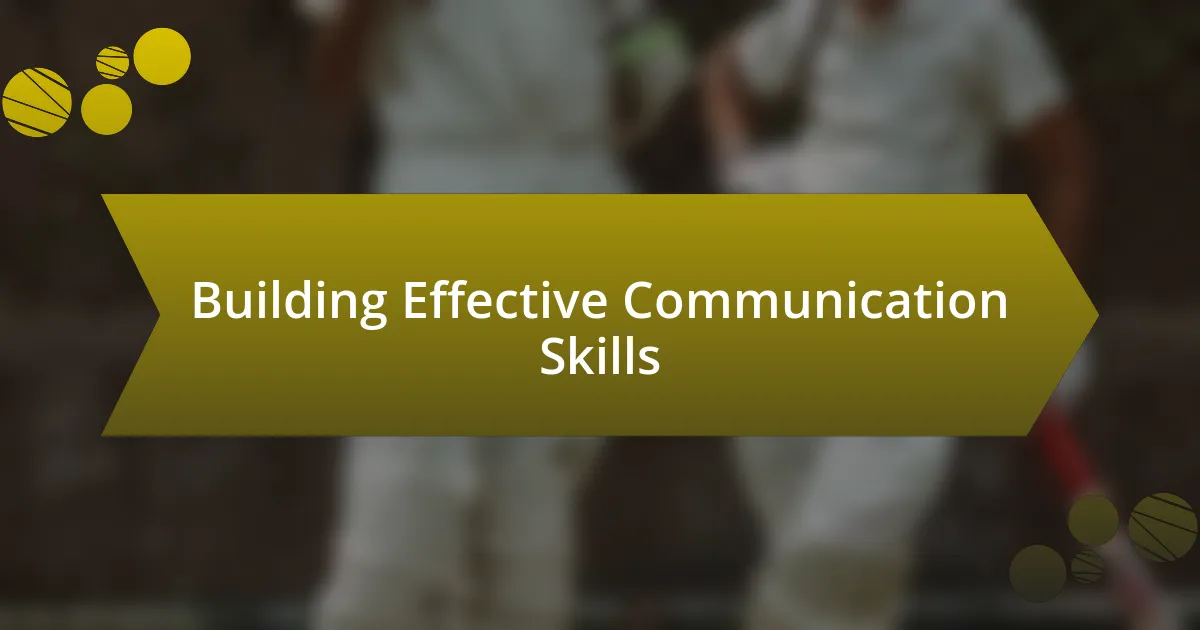
Building Effective Communication Skills
Building effective communication skills is at the heart of successful coaching experiences. I once worked with a young professional who was struggling to express her ideas in team meetings. Instead of offering direct advice, I encouraged her to practice sharing her thoughts with me in a safe environment. Over time, I noticed the shift; her confidence blossomed, leading to more articulate contributions in her workplace. It’s a powerful reminder that communication skills can be cultivated through patient practice and genuine support.
Here are some key elements I focus on to enhance communication skills:
- Clarifying Intentions: Before conversations, I always remind myself to clarify what I want to convey. This helps me stay focused and articulate.
- Non-Verbal Cues: I pay attention to body language, both mine and others’. A smile or open stance can significantly improve engagement.
- Feedback Loops: I actively invite feedback after discussions. This not only reinforces trust but also provides insight into how my message is received.
- Empathy in Responses: Instead of just reacting, I take a moment to consider the other person’s perspective. This fosters deeper connections and understanding.
- Asking Open-Ended Questions: I find that prompts like “What are your thoughts on this?” invite richer dialogue.
These strategies have proven invaluable in nurturing clearer and more meaningful interactions.
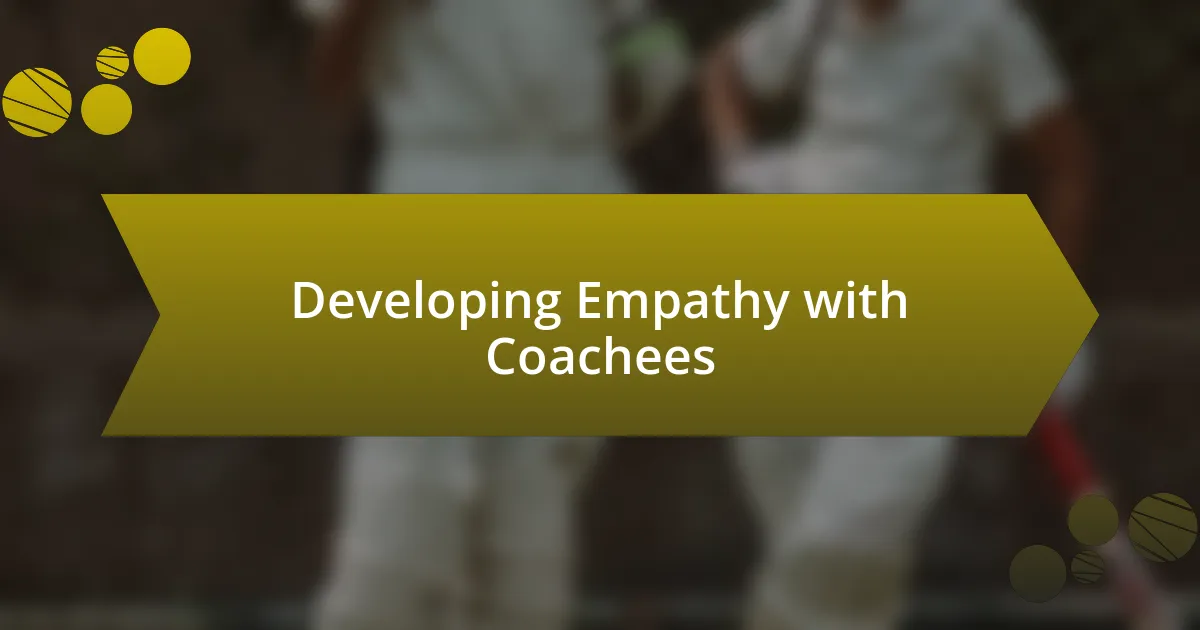
Developing Empathy with Coachees
When coaching others, I’ve found that developing empathy is essential for creating a trusting relationship. One time, I was coaching a client going through a challenging career transition. Rather than jumping straight into problem-solving, I listened to their fears and frustrations. This simple act of listening not only built rapport but also allowed me to understand their situation on a deeper level. Isn’t it interesting how taking a step back can lead to more impactful guidance?
Empathy really thrives when I consciously put myself in the coachee’s shoes. There was a moment during a session where a coachee broke down discussing their struggles. I felt their pain, and it reminded me of my own hurdles in similar situations—those shared emotions can be a powerful bonding experience. By reflecting on my feelings, it became easier to support them without judgment. This connection transforms the coaching experience, making it more about partnership than hierarchy.
One of the most profound realizations I’ve had is that empathy isn’t just about understanding; it’s about validating emotions. When a coachee shares their challenges, responding with phrases like “That sounds really tough” or “I can see why you feel that way” has made all the difference. It creates an environment where they feel safe to be vulnerable. Have you ever noticed how a few kind words can change someone’s entire outlook? This is the power of empathy in action, fostering a space where coachees can openly explore their feelings and solutions.

Utilizing Feedback for Improvement
Utilizing feedback for improvement is a cornerstone of effective coaching. After each session, I often ask coachees how they felt about our discussion. This simple question can lead to invaluable insights. For example, one coachee shared that they felt overwhelmed by the strategies I suggested. This feedback prompted me to refine my approach, tailoring my coaching style to be more digestible and actionable for them.
I’ve learned that embracing constructive criticism from my coachees can be an eye-opening experience. Once, a client candidly expressed that my explanations were too technical, leaving them confused. This moment was humbling but also enlightening. It made me realize that effective communication is as essential as the advice I offer. Have you ever had a moment where someone’s honesty reshaped your perspective? It’s an essential part of growth.
Engaging in an ongoing dialogue about feedback has transformed my coaching practice. By fostering an atmosphere where coachees feel comfortable sharing their thoughts, I’ve unlocked a treasure trove of insights that guide my methods. For instance, I’ve started using their suggestions to pivot our discussions, making sessions feel more collaborative and tailored. This adjustment has not only enhanced their learning experience but has also deepened our connection. Isn’t it rewarding to see how mutual feedback can lead to profound growth for both the coach and coachee?
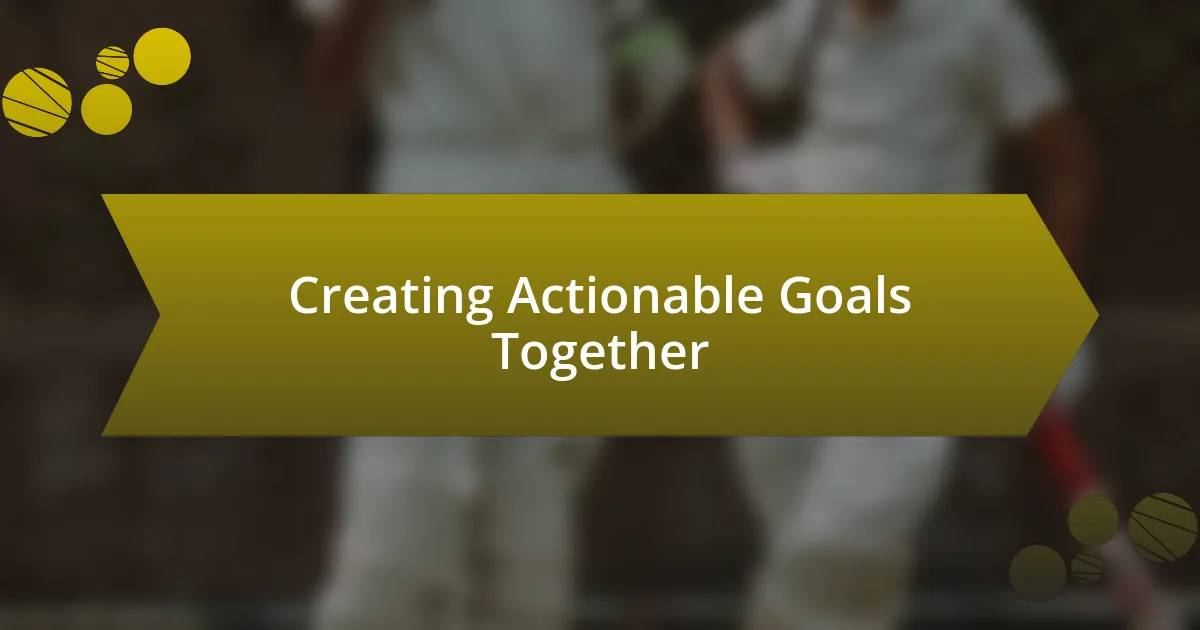
Creating Actionable Goals Together
Creating actionable goals together has been one of the most rewarding aspects of my coaching experience. During a session with a coachee who was feeling uncertain about their career path, we sat down to brainstorm tangible steps. It was incredible to witness how their eyes lit up when we transformed abstract desires into specific, achievable goals. Have you ever noticed how clarity can energize not just the mind, but also the spirit?
I’ve found that co-designing goals fosters a sense of ownership in coachees. One time, as we crafted a plan for her to improve public speaking, she suggested we incorporate video practice sessions. Initially, I hesitated, thinking it might be too daunting. Yet, her enthusiasm was contagious, so we experimented. The sessions turned out to be a game changer; seeing her progress firsthand was exhilarating for me too. It’s moments like these that remind me how collaborative goal-setting can transform fear into empowerment.
Moreover, I’ve embraced a practice of celebrating small victories along the way. After setting a goal to network more effectively, a coachee returned one week, thrilled to have connected with someone in their desired field. I can still remember the pride reflecting on their face; it was a small step but felt monumental. Do you realize how acknowledging these milestones can reinforce commitment and motivation? This shared journey of achieving goals doesn’t just build skills; it also deepens our connection and fosters mutual respect.










